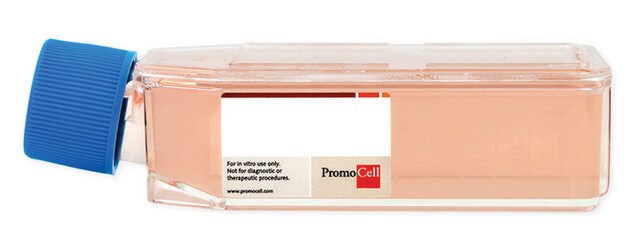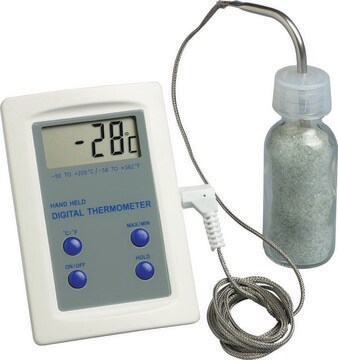3010-05A
Human Subclavian Artery Endothelial Cells: HScAEC, adult
Autenticatiper visualizzare i prezzi riservati alla tua organizzazione & contrattuali
About This Item
Codice UNSPSC:
41106514
NACRES:
NA.81
Prodotti consigliati
Origine biologica
human subclavian artery (normal)
Livello qualitativo
Confezionamento
pkg of 500,000 cells
Produttore/marchio commerciale
Cell Applications, Inc
Modalità di accrescimento
Adherent
Cariotipo
2n = 46
Morfologia
Endothelial
tecniche
cell culture | mammalian: suitable
Malattie correlate
bipolar disorder; cardiovascular diseases; cancer
Condizioni di spedizione
dry ice
Temperatura di conservazione
−196°C
Descrizione generale
Lot specific orders are not able to be placed through the web. Contact your local sales rep for more details.
HScAEC, along with human aortic (HAOEC), carotid artery (HCtAEC), coronary artery (HCAEC) and brachiocephalic artery (HBcAEC) have been used to demonstrate that not only blood vessels from different tissues are highly heterogeneous, they also interact differently with leukocytes during the inflammation response (Scott, 2013). The authors further showed that differential N-glycosylation of commonly expressed vascular adhesion molecules may be responsible for this heterogeneity, as well as for modulation of signaling under resting and activated inflammatory conditions. This also explains why specific vascular beds may be more or less susceptible to particular diseases or stimuli. Importantly, if cells from different sources were used, these results could not be convincingly validated due to a number of uncontrolled variables, such as age, race, genetic variability or life style choices of the donors.
Because of the complex heterogeneity that exists not only between different donors, but even between different vascular beds in the same individual, it would be prudent to confirm any new findings on primary cell lots coming from several different origins.
HScAEC, along with human aortic (HAOEC), carotid artery (HCtAEC), coronary artery (HCAEC) and brachiocephalic artery (HBcAEC) have been used to demonstrate that not only blood vessels from different tissues are highly heterogeneous, they also interact differently with leukocytes during the inflammation response (Scott, 2013). The authors further showed that differential N-glycosylation of commonly expressed vascular adhesion molecules may be responsible for this heterogeneity, as well as for modulation of signaling under resting and activated inflammatory conditions. This also explains why specific vascular beds may be more or less susceptible to particular diseases or stimuli. Importantly, if cells from different sources were used, these results could not be convincingly validated due to a number of uncontrolled variables, such as age, race, genetic variability or life style choices of the donors.
Because of the complex heterogeneity that exists not only between different donors, but even between different vascular beds in the same individual, it would be prudent to confirm any new findings on primary cell lots coming from several different origins.
Origine della linea cellulare
Artery
Applicazioni
blood pressure, blood supply, tissue oxygenation
Componenti
Basal Medium containing 10% FBS & 10% DMSO
Nota sulla preparazione
- 2nd passage, >500,000 cells in Basal Medium containing 10% FBS & 10% DMSO
- Can be cultured at least 10 doublings
Mantenimento delle subcolture
Please refer to the HScAEC Culture Protocol.
Esclusione di responsabilità
RESEARCH USE ONLY. This product is regulated in France when intended to be used for scientific purposes, including for import and export activities (Article L 1211-1 paragraph 2 of the Public Health Code). The purchaser (i.e. enduser) is required to obtain an import authorization from the France Ministry of Research referred in the Article L1245-5-1 II. of Public Health Code. By ordering this product, you are confirming that you have obtained the proper import authorization.
Codice della classe di stoccaggio
11 - Combustible Solids
Classe di pericolosità dell'acqua (WGK)
WGK 3
Punto d’infiammabilità (°F)
Not applicable
Punto d’infiammabilità (°C)
Not applicable
Scegli una delle versioni più recenti:
Certificati d'analisi (COA)
Lot/Batch Number
Ci dispiace, ma al momento non ci sono COA disponibili online per questo prodotto.
Se ti serve aiuto, non esitare a contattarci Servizio Clienti
Possiedi già questo prodotto?
I documenti relativi ai prodotti acquistati recentemente sono disponibili nell’Archivio dei documenti.
Il team dei nostri ricercatori vanta grande esperienza in tutte le aree della ricerca quali Life Science, scienza dei materiali, sintesi chimica, cromatografia, discipline analitiche, ecc..
Contatta l'Assistenza Tecnica.

